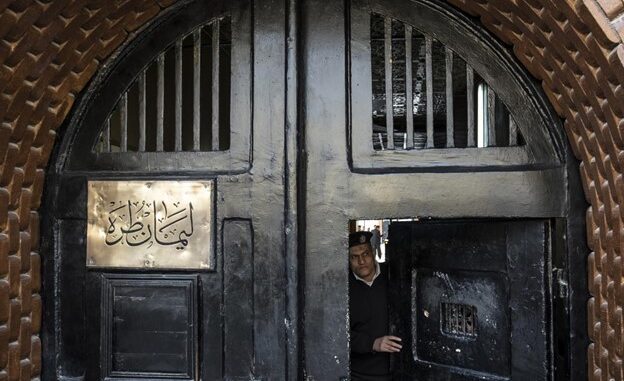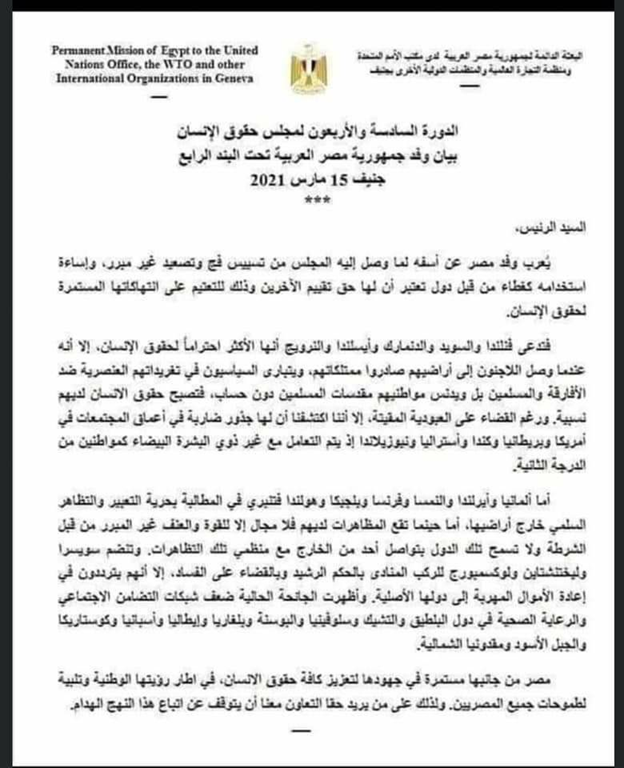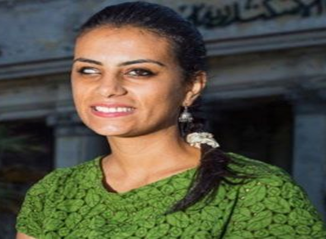
The Egyptian delegation to the 4th. Session of the United Nations Human Rights Council (UNHRC) on 15 March 2021 issued a statement in response to UNHRC joint Statement on Egypt issued on 12 March, calling on the UNHRC Joint Statement Signatories to Stop Their “Destructive Approach” .
On 12 March, the United Nations Human Rights Council (UNHRC) issued joint declaration by UN member states condemning the human rights situation in Egypt, which was delivered at the 46th Session of the UNHRC. In the declaration, governments expressed “deep concern” for widespread human rights violations committed with impunity by the Egyptian authorities.
In response to the UNHRC joint statement, the Egyptian delegation to the 4th. Session of the United Nations Human Rights Council on 15 March 2021 issued a statement attacking the 31 countries that signed the UNHRC joint statement on 12 March, including the United States and Western countries.
The statement said the “Egyptian delegation expresses its regret at the United Nation Human Rights Council (UNHRC) politicization, unjustified escalation, and its misuse as a cover by countries that believe they have the right to evaluate others, with the aim of covering up their ongoing violations of human rights”.
“Finland, Sweden, Denmark, Iceland and Norway claim that they are the most respectful of human rights, but when refugees arrived on their lands, they confiscated their property; while politicians compete in posting racist tweets against Africans and Muslims; and even their citizens desecrate the sanctities of Muslims without accountability; thus, their approach to human rights has become relative. Despite elimination of the abominable slavery, we have found out that it is deeply rooted in societies in countries like the United States, the United Kingdom, Canada, Australia and New Zealand, where non-white people are treated as second-class citizens,” the statement read.
The statement continued its attack on the UNHRC joint statement signatories, saying: “As for Germany, Ireland, Austria, France, Belgium and the Netherlands, they only advocate freedom of expression and peaceful demonstration outside their territories, but when demonstrations erupt at home, they have no choice but the use of force and unjustified violence by the police; while they (those countries) do not allow any foreign country to communicate with organizers of these demonstrations. Switzerland, Liechtenstein and Luxembourg join the rally calling for good governance and elimination of corruption, but they are reluctant to return the smuggled money to their countries of origin. The current pandemic has demonstrated weakness of social solidarity and health care networks in the Baltic countries, the Czech Republic, Slovenia, Bosnia, Bulgaria, Italy, Spain, Costa Rica, Montenegro and Northern Macedonia.”
The statement concluded, saying, “Egypt on its part is maintaining efforts to boost all human rights, within the framework of its national vision and to meet the aspirations of all Egyptians. So, those who really want to cooperate with us should stop taking this destructive approach.”

Bahey Eldin Hassan, director of the Cairo Institute for Human Rights Studies, posted a tweet on his Twitter account, saying, “It is not easy to find a diplomat who accepts to read a statement that mocks his government and himself!
Many Egyptian diplomats complain that they are being forced to defend falsehood in Egypt. Although some of them are convinced of the Sisi regime, they believe that many of his repressive measures against the Egyptians have become lacking any logical justification, but rather harm a regime in which they still believe!”
Dr. Mohamed Mahsoub, an Egyptian politician and former minister of state for parliamentary affairs, tweeted saying, “Shameful Egyptian statement in response to the United Nations Human Rights Council condemnation of the human rights situation in Egypt.
How can a wise person justify wasting the rights of his own citizens by claiming that others do that; and therefore, they are not allowed to criticize him.
Is it difficult for them to understand that respecting the rights and freedoms of people is the duty of the ruling authority, regardless of what others do?!”
The UNHRC joint declaration, signed by 31 states and delivered by Finland at the Council’s 46th session, highlighted “restrictions on freedom of expression and the right to peaceful assembly, [and] the constrained space for civil society and political opposition.” It also condemned the use of counterterrorism laws to punish peaceful critics.
“The March 12 declaration ends years of a lack of collective action at the UN Human Rights Council on Egypt, despite the sharply deteriorating human rights situation in the country,” said Bahey Hassan, director of the Cairo Institute for Human Rights Studies. “Countries should continue to make it clear to the Egyptian government that it will no longer have a carte blanche to arbitrarily imprison, torture or violate the right to life, or unlawfully kill people.”
More than 100 NGOs from around the world wrote to UN member states in early 2021, warning that the Egyptian government is attempting to “annihilate” human rights organizations and eradicate the human rights movement in the country through sustained, widespread, and systematic attacks.
The organizations had asked UN member states to adopt a resolution establishing a monitoring and reporting mechanism on Egypt. The declaration delivered on March 12 is a significant step and should be followed up by concrete action toward achieving this goal, the organizations said. The declaration was on the Council’s agenda under Item 4, which provides a space to raise concerns about grave and systematic human rights violations, including country-specific situations.
The last joint declaration on the human rights situation in Egypt at the Human Rights Council was delivered by Iceland and co-signed by 26 countries in March 2014.
Since that time the human rights situation in Egypt has deteriorated dramatically. The Egyptian authorities have virtually obliterated almost all space for free expression, peaceful assembly, and association. Under President Abdel Fattah al-Sisi’s rule, security forces, with the complicity of prosecutors and judges, have arrested, detained, or prosecuted thousands of people; including hundreds of human rights defenders, religious minorities’ rights activists, peaceful protesters, journalists, academics, artists, politicians, and lawyers.
Many have been forcibly disappeared, tortured, or otherwise ill-treated, and detained for months or years in inhumane conditions without trial. Those detained are regularly held on the basis of unfounded terrorism-related charges. If referred to trial, individuals are often convicted in grossly unfair proceedings before military courts and through mass trials. Many have been sentenced to death and executed after unfair trials that have relied on statements likely obtained through torture. The authorities have also used morality and debauchery laws to arrest and detain women influencers, sexual violence survivors and witnesses, and LGBTI individuals and activists.
The UN Working Group on Arbitrary Detention has found that arbitrary detention is a systematic problem in Egypt. The UN Committee against Torture said in 2017 following an inquiry on Egypt that the facts gathered by the committee “lead to the inescapable conclusion that torture is a systematic practice in Egypt.”
“Today’s declaration sends a clear message to the Egyptian authorities that the world will no longer turn a blind eye to their relentless campaign to crush peaceful dissent. The authorities must take urgent action to comply with their obligations under international law, starting by releasing the thousands of men and women arbitrarily detained, protecting those in custody from torture and other ill-treatment, and ending the crackdown on peaceful activism, ” said Kevin Whelan, Amnesty International representative to the UN in Geneva.
In the March 12 joint declaration, governments called for “accountability and an immediate end of impunity” for abuses. Governments also called on Egypt to cease “abuses of due process,” the excessive use of “extended pre-trial detention,” and “the practice of adding detainees to new cases with similar charges after the legal limit for pre-trial detention has expired.”
Governments that have joined the declaration led by Finland include: Australia, Austria, Belgium, Bosnia and Herzegovina, Bulgaria, Canada, Costa Rica, Czech Republic, Denmark, Estonia, France, Germany, Iceland, Ireland, Italy, Latvia, Liechtenstein, Lithuania, Luxembourg, Montenegro, the Netherlands, New Zealand, North Macedonia, Norway, Slovenia, Spain, Sweden, Switzerland, the United Kingdom, the United States of America. Other governments can join the declaration until two weeks after the end of the current Human Rights Council session.
“Bringing the human rights situation in Egypt to the attention of the Human Rights Council and properly addressing these abuses is of fundamental importance to ensure Egypt’s long-term stability and the dignity of its people,” said John Fisher, Geneva director at Human Rights Watch.



